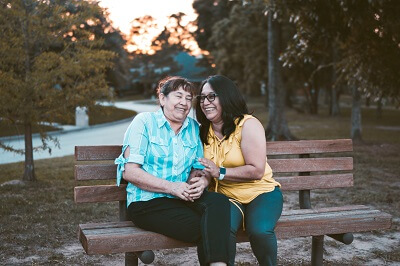
In this blog, we put the spotlight on four ground-breaking research projects that are leading the charge in improving outcomes for people affected by breast cancer.
Every year, we commit millions of dollars to outstanding research teams across the country, thanks to the generous donations of the Cancer Council community.
Read on to learn more about the four latest projects leading advancements in the treatment of breast cancer.
1. Switching off a gene in aggressive breast cancers
Dr Pilar Blancafort, The Harry Perkins Institute of Medical Research & The University of Western Australia (2022-2024)
Dr Blancafort and her team's goal is to help more women survive the most common type of breast cancer.
Two thirds of breast cancers are ER+ breast cancers, or "oestrogen receptor positive" breast cancers, which means they're linked to the hormone oestrogen.
ER+ breast cancer is usually treated with hormone therapy that blocks oestrogen. But unfortunately, this treatment is ineffective for about 1 in 5 cases.
Dr Blancafort and her team have discovered a gene which might be responsible for this resistance to hormone therapy. They want to develop a test that can easily identify this gene, as well as identify drugs that are capable of blocking it altogether.
2. Monitoring for early signs of treatment resistance in breast cancer
Associate Professor Yuling Wang, Macquarie University (2022-2024)
In this project, Associate Professor Wang is aiming to help women with metastatic ER+ breast cancer live longer.
Currently, once ER+ breast cancer has become metastatic and spread, there is no curative treatment available. A new class of drugs - called CDK4/6 inhibitors - have improved survival rates by several months. But this treatment eventually fails, as tumours develop a resistance.
A/Prof Wang and her team want to develop a test that can detect the earliest signs of metastatic ER+ breast cancer tumours developing resistance to these drugs.
If successful, this will enable doctors to offer alternative treatment approaches - such as enrolment in new clinical trials - before the cancer progresses further.
3. Blocking the spread of triple-negative breast cancer
Associate Professor David Croucher, The Garvan Institute of Medical Research (2022-2024)
Associate Professor Croucher and his team want to discover new treatment options for triple-negative breast cancers (TNBC) that have spread.
TNBC is an aggressive form of cancer that accounts for around 10-20% of breast cancer cases. There are no treatments that specifically target this type of breast cancer.
This means that TNBC comes with a lower survival rate and higher chance of spreading to other parts of the body compared to other types of breast cancer.
In this project, the team will conduct pre-clinical tests of two drugs that are already approved for treatment of other cancers and have shown promise for TNBC. If successful, they hope to rapidly translate their work into clinical trials for patients with advanced TNBC.
4. Understanding how some cancers evade immunotherapy
Associate Professor Alexander Swarbrick, The Garvan Institute of Medical Research (2022-2024)
Associate Professor Swarbrick wants to understand why immunotherapy is yet to make a substantial impact on treatment for advanced breast cancer.
In recent years, immunotherapy has revolutionised the treatment of cancers such as lymphoma, melanoma and lung cancer. However, until now, it has shown little promise for breast cancer.
A/Prof Swarbrick and his team have found strong evidence that 'stromal cells', which reside in breast cancers, might play a role in blocking immune cells from attacking the cancer cells.
In this project, they want to learn more about how and why stromal cells hinder immunotherapy. Their long-term goal is to develop methods to disable stromal cells and make immunotherapy a viable treatment option for breast cancer patients.
Thanks to the generosity of the Cancer Council community, we can invest millions of dollars to fund new research projects every year.
Click through to learn more about other projects we're currently funding or how we choose which projects to fund.






